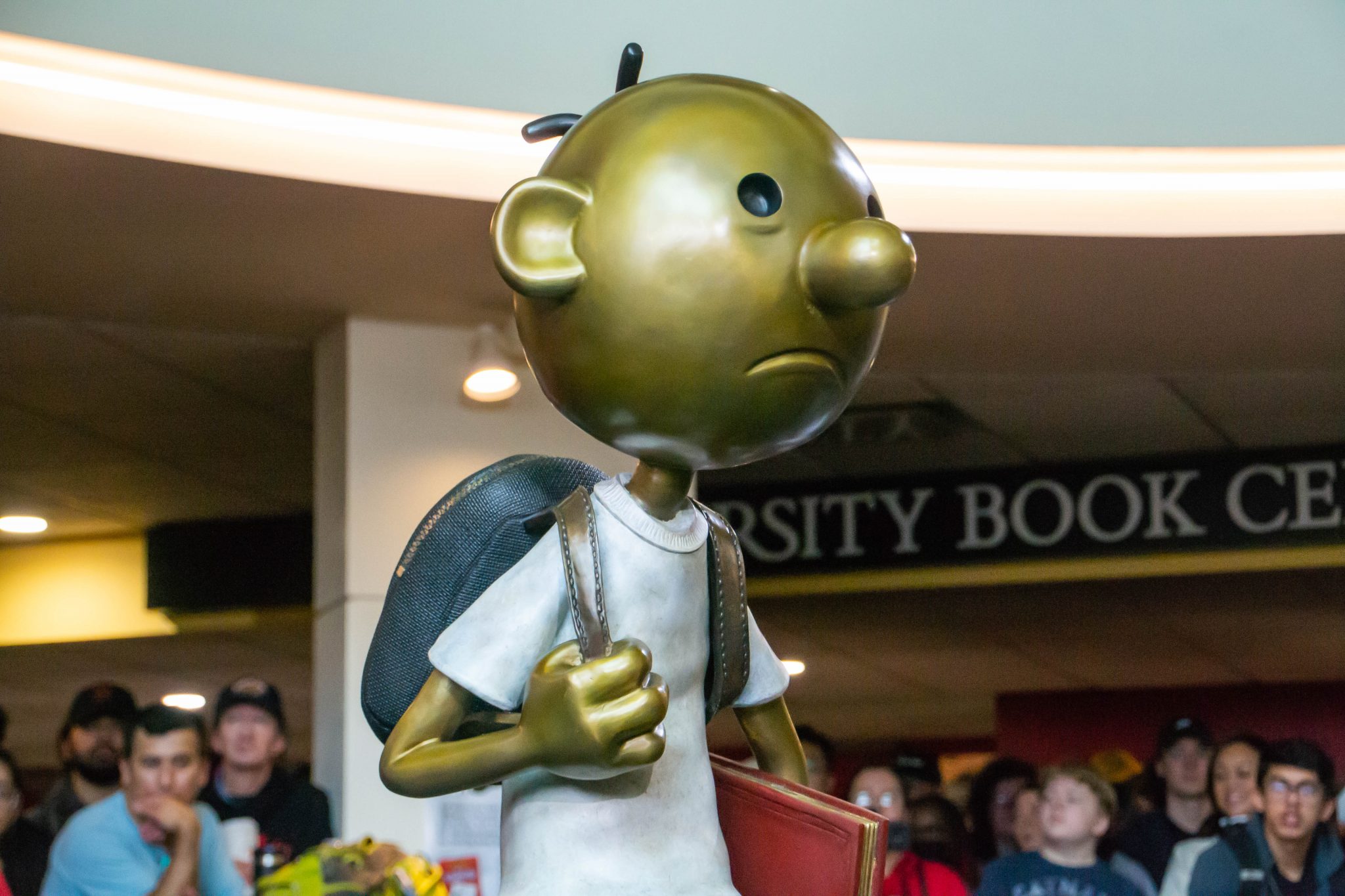Views expressed in opinion columns are the author’s own.
Greg Heffley, narrator of Diary of a Wimpy Kid, has become the most relatable member of the University of Maryland’s pantheon of statues. If our most popular deity, Testudo, represents the scholastic mastery we beg for during finals, Greg represents the daily grind. His sleep deprived eyes, slumped shoulders weighed down by his too-heavy backpack and his bewildered expression are reflections of the unglamorous parts of the student experience.
Despite his appearance, Greg is the tenacity and hope that keeps us going during the tough times. I didn’t choose to stay in McKeldin Library two nights in a row till 4 a.m. for fun — I did it because I want my hard work to pay off.
These values give rise to the McKeldin Testudo statue’s unique traditions. Why should Testudo get all the fun? Instead of booze and nose rubs, Greg should get sacrifices of childrens’ books. This university’s administration and the Student Government Association should work together to organize a book drive at Greg’s neatly laced sneakers. Then, they should donate these books to local schools and libraries. Over time, this book drive can evolve into another tradition woven into campus culture.
The Diary of a Wimpy Kid books played a big role in shaping who I am. I was a late reader — I couldn’t actually read until the end of first grade. But the pages of Diary of a Wimpy Kid, filled with both words and illustrations, transitioned me from picture books to chapter books.
My love of reading that began with Greg exposed me to diverse ideas and vast literary worlds. It enriched my childhood and gave me the imagination to think about how I could create a positive impact in my future career. Books have given me motivation to work hard toward creating the wonderful world that currently only exists in fiction. This drive has motivated me and given me a solid foundation for success in school.
But my experience with reading hasn’t necessarily been that of kids in Prince George’s County Public Schools. Most students in the area score below grade level on district tests, which is linked to trouble with reading. Early literacy is a gateway to future success. There have been efforts to increase early childhood literacy through the University of Maryland Medical System and local libraries. But this university can help to improve childhood literacy. Books sacrificed to the Greg statue can also create closer ties between this university and kids that might become students here.
Even if it’s too hard to latch on to the existing program, this university has a history of supporting local schools. The Lakeland STARS program connects student tutors, who are a part of the College Park Scholars program, with a local elementary school. It can’t be terribly difficult to organize giving books to students through this program.
Some parents might feel uncomfortable giving donated books to their children. They might feel donated books are given out of pity. That shouldn’t be a concern. Promoting reading and education in a traditionally underserved community should not have any stigmas surrounding wealth or socioeconomic status.
I grew up in a wealthy school district and my family was solidly middle class. Even then, I can only remember having three English-language books during elementary school. It wasn’t that my parents couldn’t afford more books – they just emphasized math and science and assumed I read more in school than I actually did. Providing kids with more books is always beneficial.
Supporting local students before they even think about college means many applicants to this university will be more likely to find success during and after their time here. This might mean more outstanding alumni like Greg’s creator, Jeff Kinney.
Plus, a new campus tradition could be fun! Compared to where I grew up near another large state school, this community has much less tie-in to our campus’ culture. Here, people often complain about the lack of crazed state college football culture in the community. While other Big Ten universities have upwards of 4 million football fans, we’ve struggled to keep stands full during games. But the richness of university culture does not only come from sports. For families that would benefit, receiving books sponsored by this university might also engender positive perceptions of its culture.
Fun traditions serve many purposes outside of benefiting the wider community. Taking 20 minutes to donate a book to enhance another student’s academic journey can be a needed stress break for students studying for finals.
Greg’s soulless eyes can create a bit of joy. As most students transition into adulthood in college, let’s lean into our campus’ cult-y tendencies and offer books about growing up to the younger kids.
Jessica Ye is a junior economics and government and politics major. She can be reached at jye1@terpmail.umd.edu.



